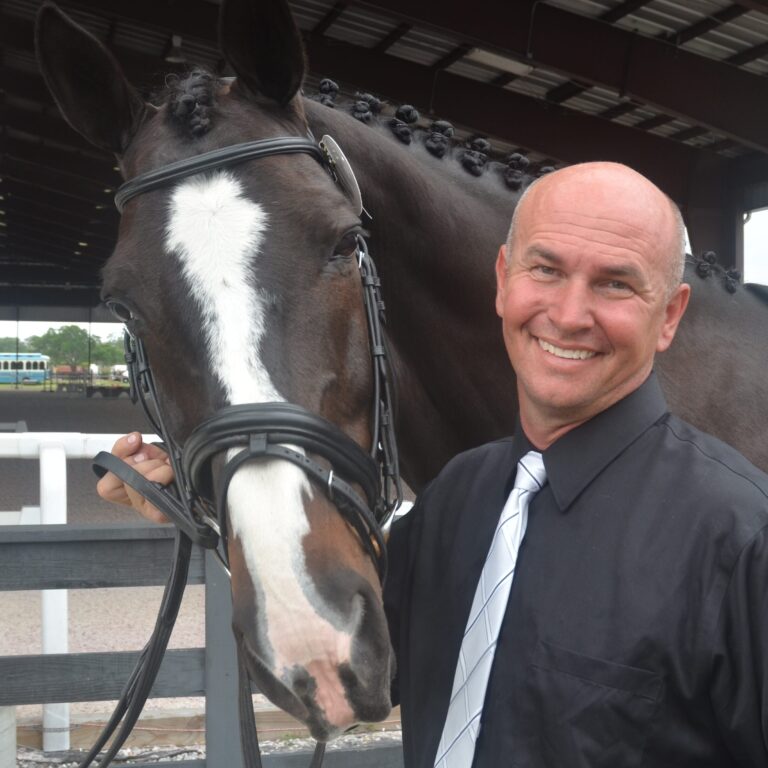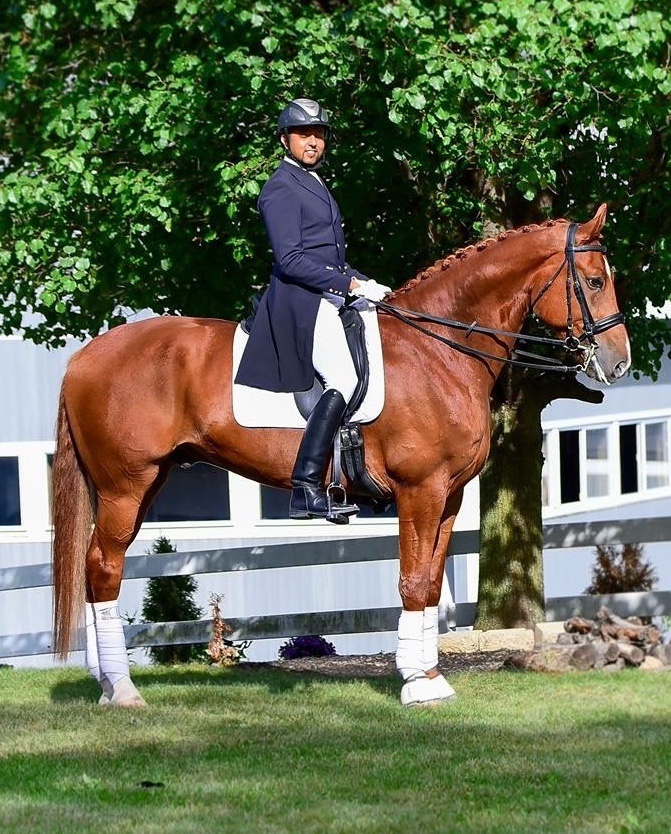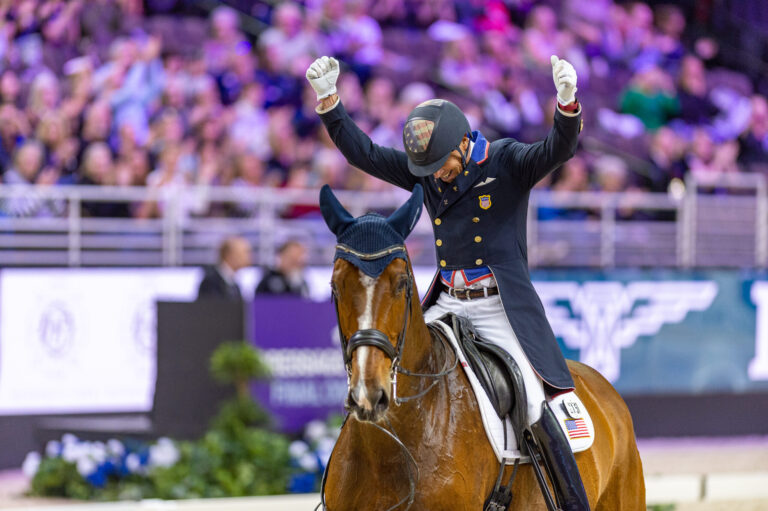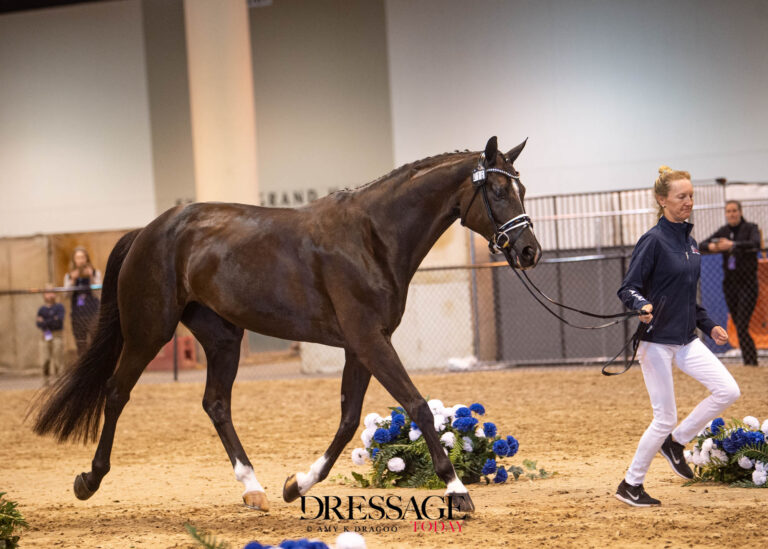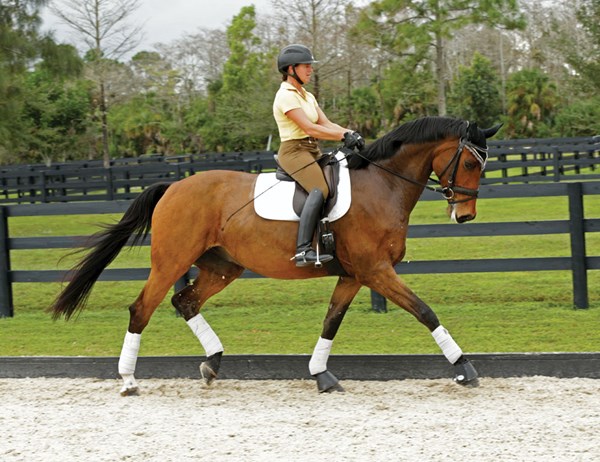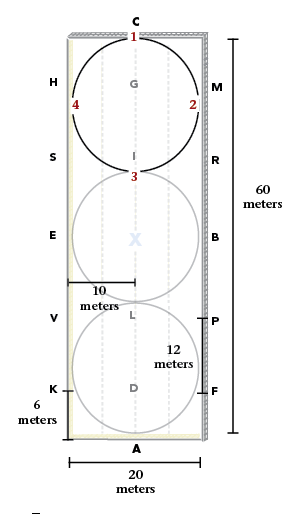Allison “Ali” Brock and Rosevelt are poised to take it to the top. She and the 14-year-old dark bay Hanoverian stallion (Rostpon-Lore, Lauries Crusador XX), owned by Claudine and Fritz Kundrun, are ranked in the top 50 in the world and are currently sitting at No. 34. They finished a successful 2016 winter show series in Wellington, Florida, with three first-place finishes at the end of the Adequan Global Dressage Festival series, including 74.333 percent in the Grand Prix Special, 73.700 percent in the Grand Prix at the CDI3* in April and 74.255 percent in the Grand Prix Special at the CDI4* in March. The duo were members of USA’s gold-medal-winning Nations Cup “girl-power” team, made up of Ali, Shelly Francis, Laura Graves and Kasey Perry-Glass, at the CDIO5* in Compiègne, France, in May. The two may be a powerhouse duo, but the 36-year-old rider calls Rosevelt “Rosie”—hardly a macho name for a stallion. “I know it’s a girl’s name, but he’s so sweet and it suits him,” she said.
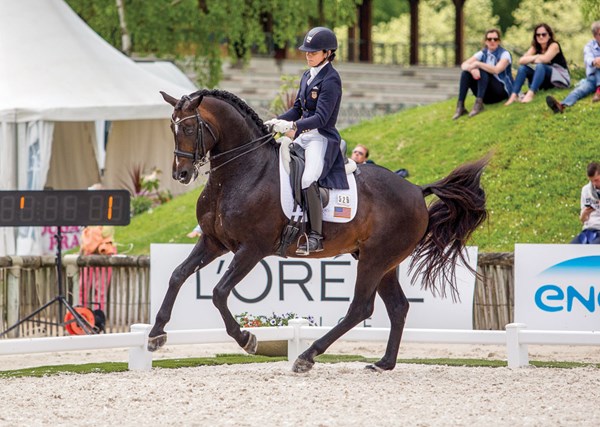
Here are 15 things Dressage Today found out about the pair:
1. Ali said if Rosie were human, he would be that good-looking jock in high school who didn’t know he was Mr. Wonderful. “He’d be that guy who is good in sports and smart and plays in the band and gets along with everybody,” she said. “He doesn’t brag about himself, he just knows he’s good. He’d be that guy.”
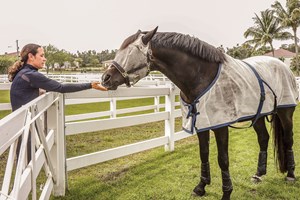
2. Rosie occupies what Ali calls “the penthouse stall” at the Kundrun’s DeerMeadow Farms in Florida. The corner suite with two windows was the former home of Sue Blinks’ horse, Flim Flam. Ali groomed for Blinks on her journey to the 2002 World Equestrian Games in Jerez, Spain, where the U.S. captured the silver medal. She said the experience shaped her as a professional. “I learned an awful lot working for that lady,” she said. “To be a part of that silver-medal team was an amazing experience for a 22-year-old kid.”
3. Rosie hates to be brushed. “Being dirty is his preferred state,” Ali said. “It’s a good thing he’s dark. We have to curry him with the softest rubber curry, and he still protests. Then we have to brush him with the softest brushes we have to try not to offend him. He’s a guy—one who knows how to clean up when necessary but one who also knows how to relax on the couch while drinking beer and watching football in his dirtiest shirt.”
4. He loves to stick out his tongue. “He’ll stick it out and put it on you,” Ali said. “Or he’ll push on you. He’s done this as long as I’ve known him, and he behaves the same way with other horses.”
5. Ali believes that horses should have time to be horses. Rosie gets two to five hours of turnout a day. The first thing he does is head straight to his self-dug sand pit and roll. He also loves to nap in the sunshine. “If he thinks you are coming for him too early, he’ll see you, bellow and then run up to his pit and throw himself down in it,” Ali said. “Then he’ll come to you and let you catch him.” Their weekly work schedule also includes time to chill out. Rosie gets two days of arena work followed by a hack day, then two more work days, another day to hack out and then a day off to enjoy his sand pit.
6. Although Rosie has been a breeding stallion in the past, he is taking a temporary hiatus from that part of his life. He has foals on the ground in Sweden, and Ali gets photos of his offspring from time to time. “He puts a very good walk and great character on his babies,” she said. He was last used for breeding in 2010, and Ali asked if that part of his life could be put on hold until Rosie’s Grand Prix career is over. He knows if he’s wrapped above his knees, he’s going to be bred. If not, he’s all business. “He’s been promised that when he’s done being my fancy-schmancy Grand Prix horse, he can go back to his other career,” Ali said. “That’s the deal.”
7. Rosie is cold-backed and requires a routine to get him loose and ready to go. “I walk him out to the arena and then back him up. That’s just to check where he is mentally and loosen his back up,” Ali said. “At home, he walks a minimum of 20 minutes on the buckle before he ever does anything and then I pick up the reins and I walk him another five to 10 minutes just doing lateral work so I know he’s really loose and ready. At the horse show, we’re to this place now where he is doing a 25-minute warm-up, which is very short. He just goes in there and I’ll let him saunter around, and if he gets worried, I’ll put him on the bit and maybe move him around a little sideways just to make sure he’s OK. He’s trained and he’s older and he’s experienced and I have to trust him. I have a pretty specific warm-up but it’s evolving because he’s evolving. Mostly it’s ‘Are you on the aids? Are you in front of my leg? Are you responding to the half halt? If I put my leg on, what kind of reaction do I get? If I pull on the reins, what kind of reaction do I get?’ Then I tune up whatever I need to before I go in.”
8. Rosie may be cold-backed but he’s hot. “He used to buck in the canter tour,” Ali said. “He’d just get hot, hot, hot in the trot tour and then he’d come to the canter tour and be like, ‘Whooo hooo!’ I used to call it ‘spronging.’ He’d just kind of porpoise. It took him awhile to learn how to deal with his excitement. Thank God the Kundrun’s were really patient with both of us during this time period because it was a real process.
“As a Small Tour horse, he was very reliable and successful, but when he started really piaffing, he accessed a place of inner heat that awakened a sleeping giant,” Ali continued. “It took him a long time to get comfortable in that place, and it took me knowing that I had to keep taking him out and test riding in national classes until he was settled. Horses arrive when they are meant to arrive and we cannot force the issue. All we can do is keep exposing them to the situation and build comfort and confidence in the new environments. If I have a horse who is secure at home in all of the movements, I don’t worry about taking a low mark at a show when they are first learning how to cope in that kind of environment. Horses need the experience. Rosie took two years to really transition into a secure Grand Prix horse, then another year to really get solid in the show ring. He had a very hard time learning his one tempis, yet they are so straight and so secure now that if I didn’t tell you that you would never know. He just needed time and patience.”
9. She may be a superstar, but Ali is also star-struck. She has a helmet signed by U.S. show jumper Kent Farrington, who lives down the road from her in Wellington. The signature reads “To Ali, Best of luck, Kent Farrington.” She jokingly calls the helmet “My Precious.” “Talk about being a nerd,” she laughed.
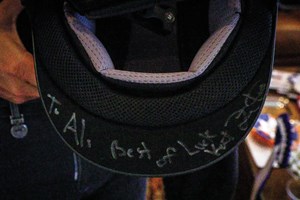
Right after the 2014 Dressage at Devon when she won the Grand Prix and Grand Prix Special, Olympian Will Coleman, whom she coaches for his dressage phase, asked her to ride a couple of horses for him at the end of the day. “I was pretty sweaty from working all day and had on an old pair of boots that were full of holes and needed to be retired.” Will texted her asking if it was OK if David was there. “I thought David who? I pulled into the farm and it’s THE DAVID. David who needs no last name, individual Olympic Gold Medalist O’Connor. I was mortified! Had I known, I would have shown up more presentable. I have so much respect for him!”
10. Ali said the George Morris talking action figure she has in her tack room keeps her in line as he admonishes, “Practice, my dears, doesn’t make perfect. Perfect practice makes perfect,” and “You are very beautiful … I hope you have a brain.”
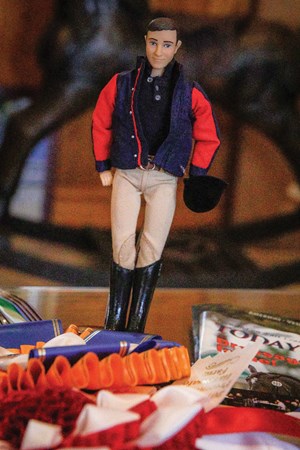
11. Ali has been forbidden from packing anything to go to shows or to travel. Not because she forgets stuff but because she has been deemed “too messy” by her assistants. She is detail-oriented in the training and care of her horses but she is forbidden from organizing equipment. “They accuse me of being a tornado that just leaves messes. I’m hardly allowed to fold laundry.”
12. Ali may be banned from packing but she is methodical about her showing preparation and routine. “I have a particular order to getting ready and mentally prepared for a class that I do not deviate from,” she said. “Being structured and having a routine helps keep me focused and calm no matter what happens leading up to the class. “I always spend some quiet time visualizing my test two hours out. I get dressed around an hour out from when I planned to get on, I saddle the horse 20 minutes out and bridle 10 minutes out. I put on my coat, headset and helmet, and try not to leave the barn before the exact time I’ve decided to get on. I do have a pair of lucky socks that I wear (and yes, they get washed) and I usually have small good luck gifts that people have given me tucked away in my coat pocket. The pin for my stock tie is also a gift a trainer named Amy Larson gave me when I was 21. It was to wear when I did my first Grand Prix and it took me waiting until I was 30 to earn the right to use it! I wear it every time I compete now.”
13. Ali occasionally misreads her ride times and has missed a flight due to the same mistake. She now has someone double check both her ride times and her flights. “16:00 is not 6:10,” she said. “I nearly missed an Intermediaire II a few years ago over the same kinds of mistake. I made it but it was a very short warm-up!”
14. It’s no secret, but Ali loves her fellow teammates and was thrilled to travel to Europe to train and compete with them this summer. “Even though there’s a ton of pressure, it’s different when you are doing things with your friends and not with people who hope you fail. That’s totally genuine. We all like each other. If one of us isn’t winning, we want the other one to win.” In 2015, Ali was a member of the gold-medal-winning Team USA 1 at the Stillpoint Farm FEI Nations Cup CDIO3* in Wellington along with Kim Herslow, Olivia LaGoy-Weltz and Kasey Perry-Glass. “We learned how to be on a team and really operate as one. And by the end, Robert [Dover] was referring to us as his little army because we were. We were functioning as a unit. Dressage is such an individual sport, and we’re all used to worrying about ourselves. We learned how to function as a team; you are absolutely pushing each other up and supporting each other. It changes how you do things. It changes how you operate. We started out as individuals and left as a unit. I thought it was great because it’s a pretty exceptional experience, especially when you are competing against each other, that you feel that strongly about each other. By the end of the tour last year our motto was ‘We fight as a team and hunt as a pack.’ That’s how ‘Rah, Rah. Go USA!’ we were. It was really fun to be in that kind of group.”

15. Her advice to amateurs? “Be coachable and remember that your basic position and balance enable our horses to understand and do (or not do) what it is we are asking from them. Many problems are directly related to conflicting aids or rider balance and position issues. Educate yourself about how horses learn and think, and how you can help them understand you better. Every time you are interacting with or riding your horses, you are training them, regardless of your amateur or professional status. Be mindful. And enjoy the journey!”


